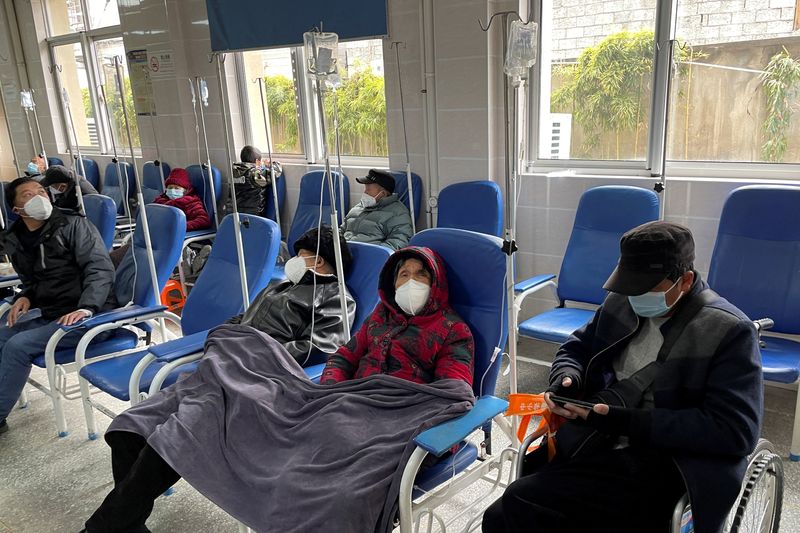By Yew Lun Tian, Brenda Goh and Jennifer Rigby
BEIJING/GENEVA (Reuters) -The World Health Organisation said a lack of data was making it challenging to help China manage the risks of a COVID-19 surge over the Lunar New Year holiday, as the world's second-largest economy reopens after three years of isolation.
The holiday, known before the pandemic as the world's largest annual migration of people, comes amid an escalating diplomatic spat over COVID curbs that saw Beijing introduce transit curbs for South Korean and Japanese nationals on Wednesday.
The virus is spreading unchecked in China after Beijing abruptly began dismantling its previously tight curbs in early December following historic protests.
The WHO said it still does not have enough information from China to make a full assessment of the dangers of the surge.
"We've been working with our China colleagues," said Abdi Rahman Mahamud, director of the WHO's alert & response coordination department, who said the country has a number of strategies around people travelling from high-risk to low-risk areas, as well as around testing and clinics.
"But to understand better we require that data," he added.
That was also an issue in working with China on how to mitigate the risks of travel ahead of the Lunar New Year, which officially runs from Jan. 21, the WHO said.
TRAVEL RESTRICTIONS
China removed quarantine mandates for inbound travellers on Sunday, one of the last vestiges of the world's strictest regime of COVID restrictions.
But worries about the scale and impact of the outbreak prompted more than a dozen countries to demand negative COVID test results from people arriving from China.
Among them, South Korea and Japan have also limited flights and require tests on arrival, with passengers showing up as positive being sent to quarantine. In South Korea, quarantine is at the traveller's own cost.
In response, the Chinese embassies in Seoul and Tokyo said on Tuesday they had suspended issuing short-term visas for travellers to China, with the foreign ministry slamming the testing requirements as "discriminatory."
That prompted an official protest from Tokyo, while South Korean foreign minister Park Jin said that Seoul's decision was based on scientific evidence, not discriminatory and that China's countermeasures were "deeply regrettable."
Deepening the spat, on Wednesday, China's immigration authority suspended its transit visa exemptions for South Koreans and Japanese.
The escalating dispute may affect economic relations between the neighbours.
Japanese department store operator Isetan Mitsukoshi Holdings Ltd and supermarket operator Aeon Co said they may have to rethink personnel transfers to China depending on how long the suspension lasts.
"We won't be able to make short-term business trips, but such trips had dwindled during COVID anyway," said a South Korean chip industry source who declined to be identified. "But if the situation lasts long, there will be an effect."
China requires negative test results from visitors from all countries.
COUNTING DEATHS
Some of the governments that announced curbs on travellers from China cited concerns over Beijing's data transparency.
The WHO also said China was still heavily underreporting deaths from COVID-19, although it was now providing more information.
China's health authorities have been reporting five or fewer deaths a day over the past month, numbers that are inconsistent with the long queues seen at funeral homes. In a first, they did not report COVID fatalities data on Tuesday.
China's Center for Disease Control and Prevention and the National Health Commission did not immediately respond to requests for comment.
Without mentioning whether daily reporting had been discontinued, Liang Wannian, the head of a COVID expert panel under the national health authority, told reporters deaths could only be accurately counted after the pandemic was over.
China should ultimately determine death figures by looking at excess mortality, Wang Guiqiang, the head of the infectious diseases department at Peking University First Hospital, told the same news conference.
Although international health experts have predicted at least 1 million COVID-related deaths this year, China has reported just over 5,000 since the pandemic began, a fraction of what other countries have reported as they reopened.
China says it has been transparent with its data.
State media said the COVID wave was already past its peak in the provinces of Henan, Jiangsu, Zhejiang, Guangdong, Sichuan and Hainan, as well as in the large cities of Beijing and Chongqing - home to more than 500 million people combined.
'INSULTING'
On Wednesday, Chinese state media devoted extensive coverage of what they called "discriminatory" border rules in South Korea and Japan, while those posting on social media mainly targeted South Korea, whose border measures are the strictest among the countries that announced new rules.
Videos circulating online showed special lanes coordinated by soldiers for arrivals from China at the airport, with travellers given yellow lanyards with QR codes for processing test results.
One user of China's Twitter-like Weibo (NASDAQ:WB) said singling out Chinese travellers was "insulting" and akin to "people treated as criminals and paraded on the streets".
Annual spending by Chinese tourists abroad reached $250 billion before the pandemic, with South Korea and Japan among the top shopping destinations.
